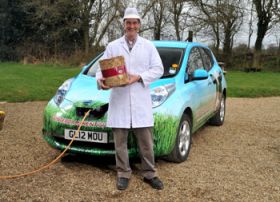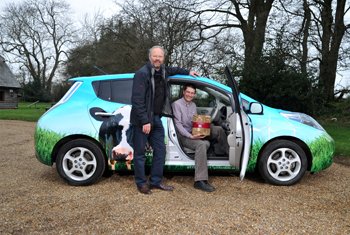23
APR
2013
Renault-Nissan Alliance Team
.
.
British cheesemaker goes carbon neutral with help from Nissan LEAF

A cheesemaker's quest to turn his business totally carbon neutral has been made possible by Nissan. Deliveries of Winterdale cheese to customers including Fortnum & Mason, The Goring and Biddenden Vineyard, are now being made using a 100% electric Nissan LEAF, finally making the cheese fully sustainable.
The Nissan LEAF used by Winterdale Cheesemakers not only produces zero tailpipe emissions, the electricity used to charge its batteries comes from photo-voltaic (PV) solar panels installed at the dairy farm at Wrotham, near Sevenoaks, in Kent. And the LEAF wears a visual reminder of Winterdale's commitment to the sustainable production of its two award-winning unpasteurised cheddars - it has been wrapped in a countryside scene, complete with images of cows and a wind turbine.
The man behind Winterdale, farmer Robin Betts, said: "We have been making sustainable cheeses for six years, but a totally carbon neutral product has not possible until now.
"The Nissan LEAF is the perfect solution, allowing us to deliver a high quality product to our discerning customers. Using a 100% electric car powered by sustainable electricity is the final link in the chain to producing carbon neutral cheese."
The LEAF will be used to deliver the cheesemaker's Winterdale Shaw and Winterdale Oak Smoked to clients including Fortnum & Mason and leading British winery, Biddenden Vineyard.
 Deliveries will also be made to The Goring, the hotel in London's Belgravia where, in April 2011, the Duchess of Cambridge - then Kate Middleton - spent the night before her wedding to Prince William.
Deliveries will also be made to The Goring, the hotel in London's Belgravia where, in April 2011, the Duchess of Cambridge - then Kate Middleton - spent the night before her wedding to Prince William.
Every day, farmer Betts collects morning milk from his herd, which is then transferred at body temperature - 370 C - to the cheese barn where cheese making begins. By keeping the milk warm, no extra energy is required to start the process.
The milk, which by now has cooled to a perfect 320 C, has starter culture, rennet and curd added. It is then cut and cooked using energy created by the PV solar panels and a ground source heat pump. Once cooked, the cheese is placed into a mould and pressed for three days. Then it is removed from the press and stored for 10 months in Winterdale's cave-like cellar, which maintains a natural constant temperature of 120 C.
So much energy is generated by Winterdale's solar panels that excess electricity is fed back to the National Grid and dispersed to local villages. This contribution more than outweighs the small amount the farm draws from the Grid on dark, winter days.
These impeccable carbon neutral credentials are now complemented by the farm's solar-powered, zero-emission Nissan LEAF.





Post new comment